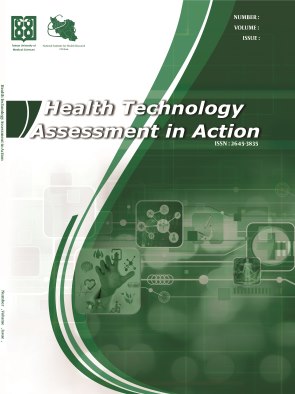An Observational Study on The Role of Magnetic Resonance Imaging in The Evaluation of Soft Tissue Tumors with Histopathological Correlation at Tertiary Care Centre
Abstract
Background: The primary aim of this study is to evaluate the role of magnetic resonance imaging (MRI) in the assessment of soft tissue tumors with histopathological correlation at a tertiary care center.
Methods: An observational study was conducted on 75 patients (n = 75) in the Department of Radiodiagnosis over 18 months. The targeted population comprised patients who presented to the Radiodiagnosis Department for radiological imaging of soft tissue tumors.
Results: Out of 75 cases, 20% were found to have benign tumors, while 80% were found to have malignant tumors. The most frequent benign tumor was fibromatosis, with n = 10 cases (13.33%), and the most common malignant tumor was synovial sarcoma, with n = 14 cases (18.66%). The benign age group ranged from 11 to 20 years. T2-weighted heterogeneous hyperintensity was noted more frequently in malignant lesions, demonstrating a high positive predictive value; that is, 83% of malignant tumors exhibited changes on diffusion-weighted imaging/ apparent diffusion co efficient (DWI/ADC). Low-grade malignant lesions showed no restrictions. Most benign lesions displayed restrictions, with a high positive predictive value of 98.14%, specificity of 93.33%, and sensitivity of 88.33%.
Conclusions: Soft tissue tumors can be detected and locally staged using MRI; thus, this technique has proven its value. Intralesional hemorrhage and calcification are two parameters that have been shown to have no substantial association with cancer. Due to its high sensitivity, MRI is a viable option for evaluating soft tissue tumors.
2. Faizi NA, Thulkar S, Sharma R, Sharma S, Chandrashekhara S, Shukla NK, et al. Magnetic resonance imaging and positron emission tomography-computed tomography evaluation of soft tissue sarcoma with surgical and histopathological correlation. Indian J Nucl Med. 2012;27(4):213-20. [PubMed ID:24019649]. [PubMed Central ID:3759080]. https://doi.org/10.4103/0972-3919.115390.
3. Sen J, Agarwal S, Singh S, Sen R, Goel S. Benign vs malignant soft tissue neoplasms: limitations of magnetic resonance imaging. Indian J Cancer. 2010;47(3):280-6. [PubMed ID:20587903]. https://doi.org/10.4103/0019-509X.64725.
4. Harish S, Lee JC, Ahmad M, Saifuddin A. Soft tissue masses with “cyst-like” appearance on MR imaging: Distinction of benign and malignant lesions. Eur Radiol. 2006;16(12):2652-60. [PubMedID:16670867]. https://doi.org/10.1007/s00330006-0267-5.
5. Maretty-Nielsen K, Aggerholm-Pedersen N, Safwat A, Jorgensen PH, Hansen BH, Baerentzen S, et al. Prognostic factors for local recurrence and mortality in adult soft tissue sarcoma of the extremities and trunk wall: a cohort study of 922 consecutive patients. Acta Orthop. 2014;85(3):323-32. [PubMed ID:24694277]. [PubMed Central ID:4062802]. https://doi.org/10.3109/17453674.2014.908341.
6. Kransdorf MJ, Murphey MD. Radiologic evaluation of softtissue masses: a current perspective. AJR Am J Roentgenol.
2000;175(3):575-87. [PubMed ID:10954433]. https://doi.org/10.2214/ajr.175.3.1750575.
7. Chen CK, Wu HT, Chiou HJ, Wei CJ, Yen CH, Chang CY, et al. Differentiating benign and malignant soft tissue masses by magnetic resonance imaging: role of tissue component analysis. J Chin Med Assoc. 2009;72(4):194-201. [PubMed ID:19372075]. https://doi.org/10.1016/S1726-4901(09)70053-X.
8. Datir A, James SL, Ali K, Lee J, Ahmad M, Saifuddin A. MRI of soft-tissue masses: the relationship between lesion size, depth, and diagnosis. Clin Radiol. 2008;63(4):373-8; discussion 9-80.[PubMed ID:18325355]. https://doi.org/10.1016/j.crad.2007.08.016.
9. Hermann G, Abdelwahab IF, Miller TT, Klein MJ, Lewis MM. Tumour and tumour-like conditions of the soft tissue: magnetic resonance imaging features differentiating benign from malignant masses. Br J Radiol. 1992;65(769):14-20. https://doi.org/10.1259/0007-1285-65-769-14.
10. Pekcevik Y, Kahya MO, Kaya A. Characterization of Soft Tissue Tumors by Diffusion-Weighted Imaging. Iran J Radiol. 2015;12(3):e15478. [PubMed ID:26557269]. [PubMed Central ID:4632135]. https://doi.org/10.5812/iranjradiol.15478v2.
11. Jeon JY, Chung HW, Lee MH, Lee SH, Shin MJ. Usefulness of diffusion-weighted MR imaging for differentiating between benign and malignant superficial soft tissue tumours and tumour-like lesions. Br J Radiol. 2016;89(1060):20150929. [PubMed ID:26892266]. [PubMed Central ID:4846217]. https://doi.org/10.1259/bjr.20150929.
12. Daniel Jr III A, Ullah E, Wahab S, Kumar Jr V. Relevance of MRI in prediction of malignancy of musculoskeletal system--a prospective evaluation. BMC Musculoskelet Disord. 2009;10:125. [PubMed ID:19811663]. [PubMed Central ID:2766372]. https://doi.org/10.1186/1471-2474-10-125.
13. De Schepper AM. Grading and Characterization of Soft Tissue Tumors. In: De Schepper AM, Parizel PM, De Beuckeleer L, Vanhoenacker F, editors. Imaging of Soft Tissue Tumors. Berlin, Heidelberg: Springer; 2001. p. 123-41.
14. Crim JR, Seeger LL, Yao L, Chandnani V, Eckardt JJ. Diagnosis of softtissue masses with MR imaging: can benign masses be differentiated from malignant ones? Radiology. 1992;185(2):581-6. [PubMed ID:1410377]. https://doi.org/10.1148/radiology.185.2.1410377.
15. Berquist TH, Ehman RL, King BF, Hodgman CG, Ilstrup DM. Value of MR imaging in differentiating benign from malignant soft-tissue masses: study of 95 lesions. AJR Am J Roentgenol. 1990;155(6):1251-5. [PubMed ID:2122675]. https://doi.org/10.2214/ajr.155.6.2122675.
16. Moulton JS, Blebea JS, Dunco DM, Braley SE, Bisset III GS, Emery KH. MR imaging of soft-tissue masses: diagnostic efficacy and value of distinguishing between benign and malignant lesions. AJR Am J Roentgenol. 1995;164(5):1191-9. [PubMed ID:7717231]. https://doi.org/10.2214/ajr.164.5.7717231.
| Files | ||
| Issue | Vol 8 No 4 (2024) | |
| Section | Articles | |
| DOI | https://doi.org/10.18502/htaa.v8i4.16983 | |
| Keywords | ||
| MRI Soft-tissue tumours Radiology Computed tomography | ||
| Rights and permissions | |

|
This work is licensed under a Creative Commons Attribution-NonCommercial 4.0 International License. |




